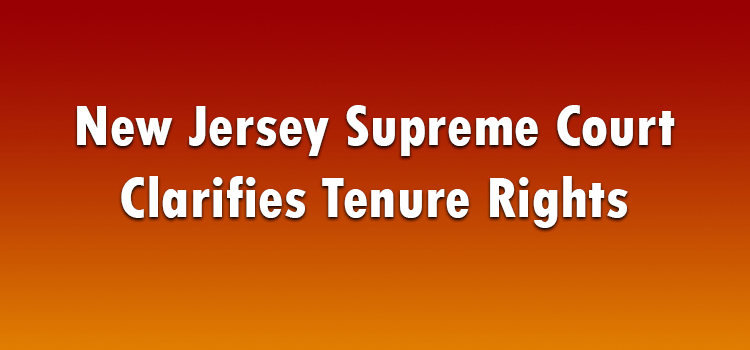In Miller v. State-Operated School District of the City of Newark, the Supreme Court of New Jersey clarified tenure rights under N.J.S.A. 18A:17-2. The decision, which triggered a sharp dissent from Justice Jaynee LaVecchia, overturned long-standing administrative law precedent.

Facts of Miller v. State-Operated School District of the City of Newark
The case revolves around whether Brenda Miller’s employment with the State Operated School District of the City of Newark (District) was terminated in violation of her tenure rights under N.J.S.A. 18A:17-2. The statute provides that “[a]ny person holding any secretarial or clerical position” has tenure after either “[t]he expiration of a period of employment of three consecutive calendar years in the district or such shorter period as may be fixed” by the board of education, or “[e]mployment for three consecutive academic years, together with employment at the beginning of the next succeeding academic year.”
Miller was hired by the District in 1998 and held various clerical and secretarial titles until 2012, all of which were classified titles under the Civil Service Act (Act). Effective July 2012, the District reclassified Miller’s position to the unclassified title of Confidential Assistant. Nearly 17 months later, the District sent Miller a letter confirming the reassignment and advising her that her new position was not governed by the Act. More than two years later, Miller received a letter terminating her employment.
Miller appealed to the Commissioner of Education, alleging her termination was unlawful because she had tenure under N.J.S.A. 18A:17-2. The Commissioner determined Miller did not earn tenure while she served in classified positions under the Act because N.J.S.A. 18A:28-2 provides that “[n]o person, who is in the classified service of the civil service of the state pursuant to Title 11, Civil Service . . . , shall be affected by any provisions of this chapter.” The Commissioner concluded Miller accrued credit toward tenure only during the period following her 2012 transfer to the unclassified position. It also found that because she had not served in that position for three consecutive years prior to her termination, she did not have tenure rights under the statute.
The Appellate Division reversed. In so ruling, the appeals court rejected the Commissioner’s conclusion that Miller’s employment in her Civil Service position could not be considered in determining if she satisfied the time in employment requirements for tenure under N.J.S.A. 18A:17-2. According to the Appellate Division:
The plain language of N.J.S.A. 18A:28-2 exempts persons employed in classified Civil Service titles from the “provisions of”’ Chapter 28, but does not exempt employees in classified titles from the tenure provisions in other chapters of Title 18A.Thus, N.J.S.A. 18A:28-2 applies only to “teaching staff member[s]” who hold classified Civil Service titles because they are the only employees “affected by” Chapter 28’s tenure provisions.
Because it found that any limitations imposed by N.J.S.A. 18A:28-2 pertain only to the tenure rights of teaching staff members “affected” by Title 28, the Appellate Division concluded that it was an “error for the Commissioner to conclude petitioner’s time employed in classified Civil Service titles could not be considered in determining petitioner’s tenure rights under N.J.S.A. 18A:17-2.”
Court’s Decision in Miller v. State-Operated School District of the City of Newark
The New Jersey Supreme Court affirmed the Appellate Division decision “substantially for the reasons expressed in the Appellate Division decision.” Justice LaVecchia authored a dissent, in which Justice Anne Patterson joined.
In her dissent, Justice LaVecchia argued that the Appellate Division’s decision “swept aside the Commissioner’s longstanding interpretation of the relevant statutes and decades of administrative jurisprudence.” She further argued:
The appellate court’s decision swept aside the Commissioner’s longstanding interpretation of the relevant statutes and decades of administrative jurisprudence. If indeed some ambiguity is discernible here, this Court should defer to the Commissioner’s interpretation of the provisions of Title 18A with respect to implementation of the tenure laws. Principles of statutory interpretation counsel that we should defer to the agency charged with administering the laws of a regulatory program entrusted to them for enforcement.
